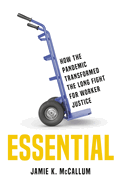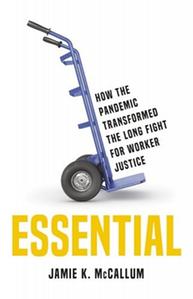
 During the early months of the coronavirus pandemic, essential workers in health care, food service and other industries were often applauded, sometimes literally. But the pandemic exposed the fault lines in a system designed to take advantage of low-wage workers. In his third book, Essential, sociologist and activist Jamie K. McCallum (Worked Over) delves into the struggles faced by such essential workers as a result of Covid-19, and places their strikes, protests and other actions in context of the long history of U.S. labor organizing.
During the early months of the coronavirus pandemic, essential workers in health care, food service and other industries were often applauded, sometimes literally. But the pandemic exposed the fault lines in a system designed to take advantage of low-wage workers. In his third book, Essential, sociologist and activist Jamie K. McCallum (Worked Over) delves into the struggles faced by such essential workers as a result of Covid-19, and places their strikes, protests and other actions in context of the long history of U.S. labor organizing.
McCallum begins with familiar facts: essential workers kept the country, and the world, going after millions of people were urged to stay home. Many of them--disproportionately women and people of color--were already struggling, economically and financially. He lambastes the big corporations that prioritized profits over their workers' safety, explaining that "the pandemic exacerbated America's preexisting crisis of care and underlined workers' role in solving it." The rest of the book focuses largely on workers' efforts to improve their situations: striking, using unions as a tool for collective bargaining, using creative tactics to get their bosses to pay attention. But, McCallum shows, their actions weren't only self-motivated: essential workers are keenly aware of how their work affects others. "We weren't just out there for us," nurse Ros Reggans told McCallum, speaking about a strike at the nursing home where she worked. "We were out there for them"--the residents at the home.
McCallum takes readers through the last hundred or so years of labor relations in the U.S., from well-known incidents like the Triangle Shirtwaist Factory fire to more recent events like some Amazon workers forming unions. Through research and interviews, he illuminates the experiences of grocery-store workers, health-care aides, food distributors and teachers, while calling to account the politicians who consistently siphon money away from vital industries and their workers. He makes multiple urgent calls for higher wages, government support and better benefits and working conditions for the people who truly keep the country going. He laments the outsized role of individualism in American life, and Americans' dependence on an economic model that exploits nearly everyone but the very rich.
Insightful, thought-provoking and peppered with helpful statistics and charts, Essential is both a clarion call to improve the lives of the working class and a primer on how their prosperity--or lack of it--is tied to the fate of all Americans. --Katie Noah Gibson, blogger at Cakes, Tea and Dreams
Shelf Talker: A veteran sociologist illuminates essential workers' struggles during the pandemic and calls for better policies to support them.

